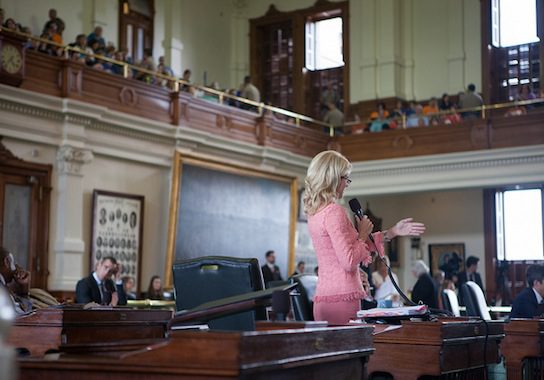Wendy Davis, Abortion, and the Media—Frozen in the Stereotype

Conventional perceptions of the abortion debate took a hit this week, as Politico and the New York Times exposed skewed abortion coverage, including the media’s glorification of Texas senator Wendy Davis and her abortion bill filibuster.
Politico contributor Gary Bauer said coverage of Davis’s filibuster “ranged from frivolous to fawning”: one Huffington Post contributor described her as “brilliant, dogged, intrepid,” “eloquent, persuasive,” and “epic.” NPR’s Wayne Goodwyn called her a “tiny ray of hope” for Texas. Davis herself said the GOP was “selfish” and “out-of-touch,” arguing that they refuse “to listen to real families with real hopes.”
But Bauer retorts that “The vast majority of Americans don’t come close to sharing Wendy Davis’s support for late-term abortion.” Rather, polls show most Americans oppose abortion after 20 weeks. A University of Texas/Texas Tribune poll found 62 percent of Texas voters supported the abortion bill. According to these numbers, Davis may be more “out-of-touch” than the GOP. But she is not the only one: most Americans, the data suggests, are out-of-touch with themselves. Bauer continues,
In May, Gallup published a survey titled Americans Misjudge U.S. Abortion Views. It found that more Americans (48 percent) describe themselves as ‘pro-life’ than as ‘pro-choice’ (45 percent). But Gallup also found that most Americans (51 percent) believe the public is mostly ‘pro-choice.’ … The sense that America supports abortion is so pervasive that even a plurality of self-described ‘pro-lifers’ believe most Americans are pro-choice.
Why this prevalent misperception? Bauer believes partisan abortion coverage has created a false picture of the issue: “The fact is that the country is deeply divided over abortion, though it overwhelmingly opposes the types of abortions Davis was filibustering to save. Unfortunately, most Americans don’t realize how much of an outlier Davis is.”
Shortly after the Texas bill passed, the New York Times ran its story on the complexity of abortion rights public opinion. “Both parties have a claim on public opinion. Maybe more to the point, both can make a strong case that the other party has an extreme view,” David Leonhardt wrote. MSNBC host and Politico blogger Joe Scarborough quickly responded: “Leonhardt’s suggestion that Republicans are no more extreme on the politics of abortion than Democrats is one rarely expressed by national media outlets, and one that more editors and news directors should note.”
When USA Today contributor Kirsten Powers lambasted the media for their “deafening silence” on the Kermit Gosnell trial this spring, abortion biases came clear. As Dave Weigel acknowledged, “Social conservatives are largely right about the Gosnell story.” The media’s silence on the Gosnell case, predominant pro-choice coverage, and laudatory filibuster reporting all show widespread prejudice on this topic. The Gallup poll Bauer references is an example of media impact on public perception, as our understanding of the world is heavily conditioned by the news.
Walter Lippman wrote in Public Opinion of the way humans amplify fears and hatreds into a “fabrication of a system of all evil, and of another which is the system of all good.” “Real space, real time, real numbers, real connections, real weights are lost,” he said. “The perspective and the background and the dimensions of action are clipped and frozen in the stereotype.”
When it comes to the “women’s rights” or the “rights of the unborn,” journalists rarely report the real complexities beneath the stereotypes. One hopes these Times and Politico stories signal more balanced coverage of a deeply complex and troubling issue. As Scarborough said, news outlets should stop “mindlessly following a left-leaning narrative … more interested in promoting political agendas than reporting on political realities.”
Comments